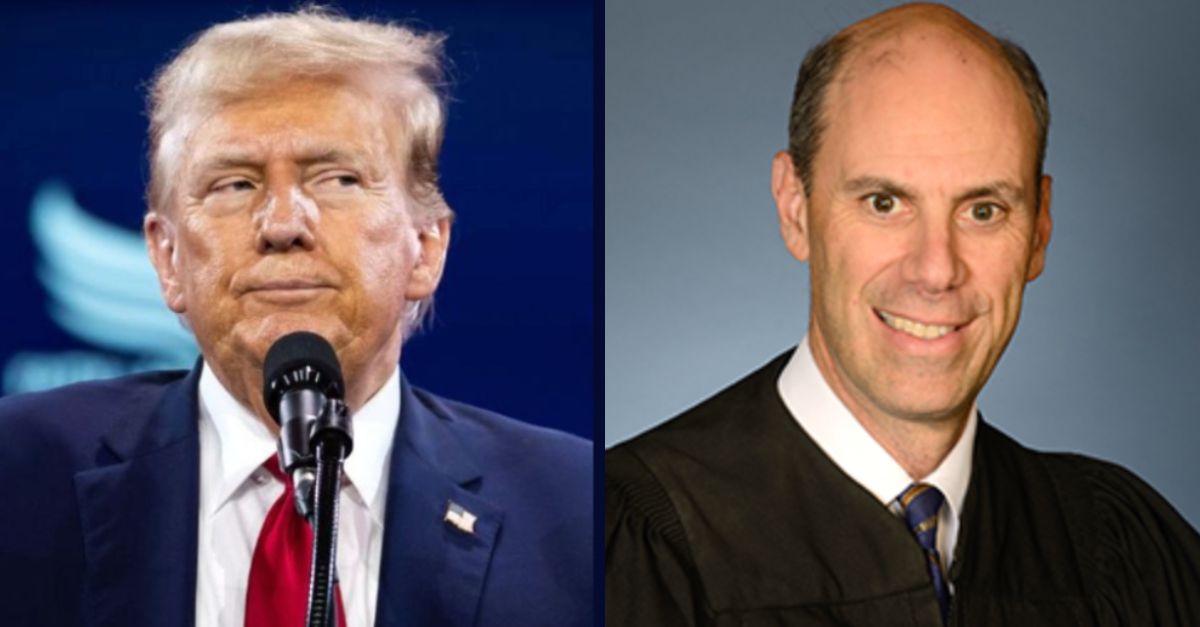
Left: Donald Trump speaks at the annual Road to Majority conference in Washington, DC, in June 2024 (Allison Bailey/NurPhoto via AP). Right: U.S. District Judge James Boasberg (U.S. District Court for the District of Columbia).
A federal judge in Washington, D.C., is moving to hold the Trump administration in criminal contempt for ignoring his March order to turn around multiple flights carrying Venezuelan migrants that were being deported without due process through the president’s unprecedented use of the Alien Enemies Act of 1798 (AEA).
U.S. District Judge James Boasberg on Wednesday said he had determined that the federal government demonstrated a “willful disregard” for his order, which was “sufficient for the Court to conclude that probable cause exists to find the Government in criminal contempt.”
“The Court does not reach such conclusion lightly or hastily; indeed, it has given Defendants ample opportunity to rectify or explain their actions. None of their responses has been satisfactory,” Boasberg wrote in a 46-page order. “The Constitution does not tolerate willful disobedience of judicial orders — especially by officials of a coordinate branch who have sworn an oath to uphold it. To permit such officials to freely ‘annul the judgments of the courts of the United States’ would not just ‘destroy the rights acquired under those judgments’; it would make ‘a solemn mockery’ of ‘the constitution itself.’ ‘So fatal a result must be deprecated by all.””
Boasberg on March 15, held an emergency hearing where he granted a temporary restraining order (TRO) barring the administration from deporting individuals under the AEA in a lawsuit brought by five Venezuelan migrants accused of being members of the Tren de Aragua (TdA) gang. During the proceedings, the judge also issued an oral bench ruling ordering the government to turn around any planes containing Venezuelan migrants that were already in the air and return them to the U.S. — an order that was infamously ignored.
In his ruling, Boasberg said that at the time he issued his oral order, the Trump administration had already loaded more than 100 migrants onto planes so they could be “spirited out of the United States by the Government before they could vindicate their due-process rights by contesting their removability in a federal court, as the law requires.”
The government claimed that because the flights had already left U.S. airspace at the time of Boasberg’s order, they were outside of the court’s jurisdiction.
Administration officials also asserted that they did not have to follow Boasberg’s oral order to turn the planes around because he did not memorialize the directive in his subsequent written order.
Boasberg addressed the government’s responses to inquiries about ignoring the court in his Wednesday order.
“Defendants provide no convincing reason to avoid the conclusion that appears obvious from the above factual recitation: that they deliberately flouted this Court’s written Order and, separately, its oral command that explicitly delineated what compliance entailed,” Boasberg wrote. “They do not dispute that it was hours after the written Order issued when they disembarked the class members aboard the two planes and transferred them out of U.S. custody. Rather than offer a mea culpa and attempt to explain this grave error and detail plans to rectify it, Defendants offer various imaginative arguments for why they nevertheless technically complied with the Order. None of their positions withstands scrutiny.”
Hearings and several “intemperate and disrespectful” court filings in the high-profile case followed, growing increasingly contentious as the litigation unfolded. However, earlier this month the U.S. Supreme Court ruled that the case — which was brought in Washington, D.C., as a class-action lawsuit under the Administrative Procedures Act — had to have been filed as a habeas corpus case in Texas, the district where the plaintiffs were being physically detained. Habeas petitions involve detainees challenging the legality of their custody and typically seeking to be released.
Despite the justices vacating Boasberg’s TROs over the “legal defect,” the judge said that the high court’s ruling “does not excuse the government’s violation.”
“Instead, it is a foundational legal precept that every judicial order ‘must be obeyed’ — no matter how “erroneous” it “may be” — until a court reverses it,” Boasberg wrote. “If a party chooses to disobey the order — rather than wait for it to be reversed through the judicial process — such disobedience is punishable as contempt, notwithstanding any later-revealed deficiencies in the order. That foundational “rule of law” answers not just how this compliance inquiry can proceed, but why it must.”
In his ruling, Boasberg said the government can “purge its contempt” by “asserting custody of
the individuals who were removed in violation of the Court’s classwide TRO so that they might avail themselves of their right to challenge their removability through a habeas proceeding.” The government would not be required to release the detainees or “transport them back to the homeland” to remedy the alleged violation.
“If Defendants opt to purge their contempt, they shall file by April 23, 2025, a declaration explaining the steps they have taken and will take to do so,” he wrote. “If Defendants opt not to purge their contempt, they shall instead file by April 23, 2025, declaration(s) identifying the individual(s) who, with knowledge of the Court’s classwide Temporary Restraining Order, made the decision not to halt the transfer of class members out of U.S. custody on March 15 and 16, 2025.”
Love true crime? Sign up for our newsletter, The Law&Crime Docket, to get the latest real-life crime stories delivered right to your inbox.







